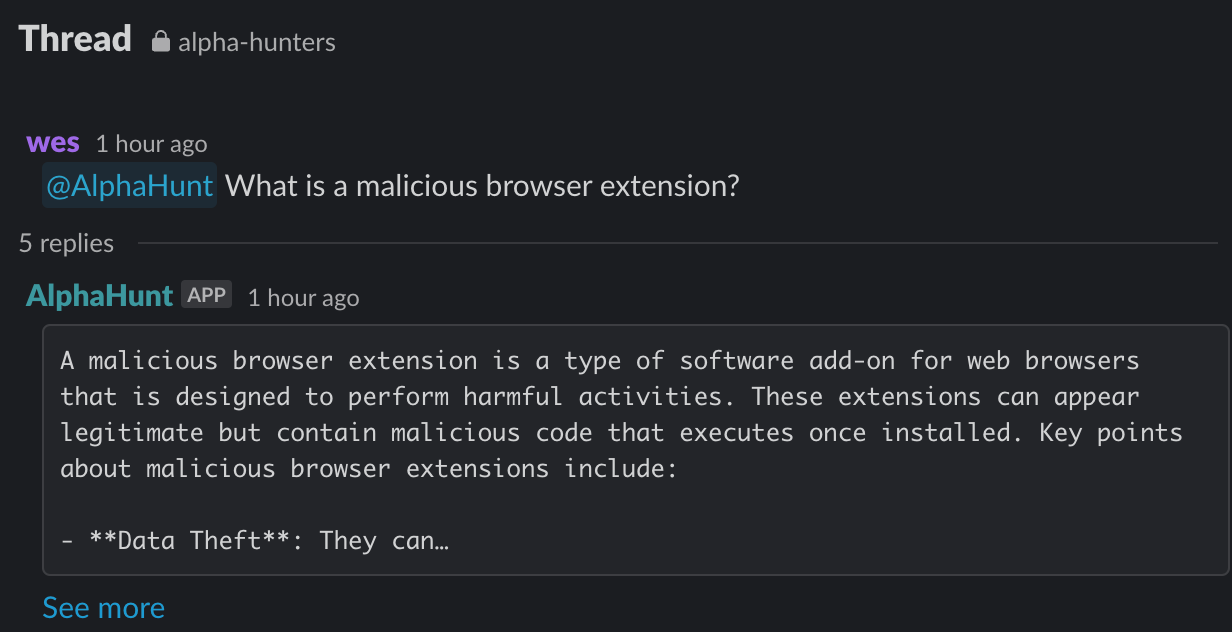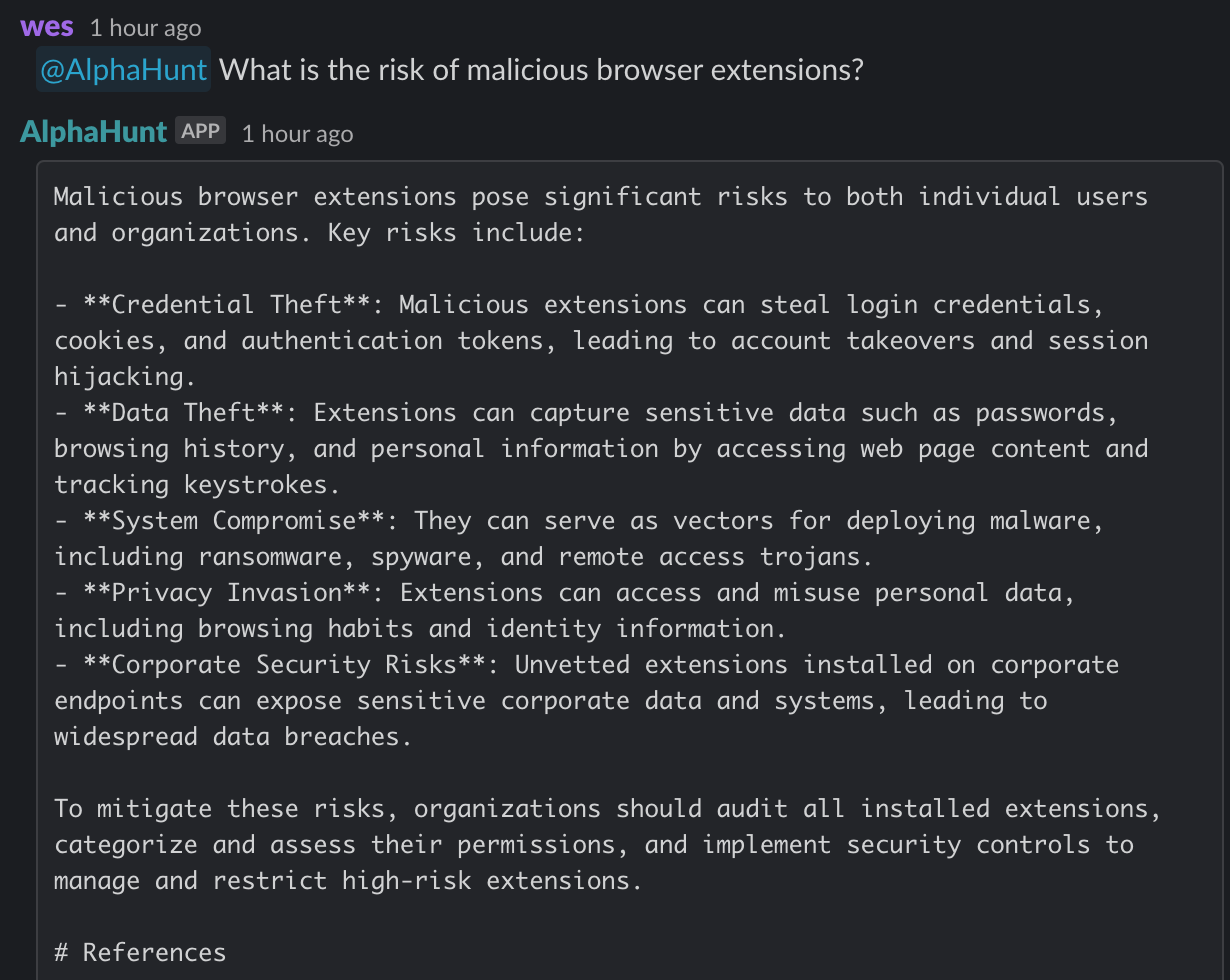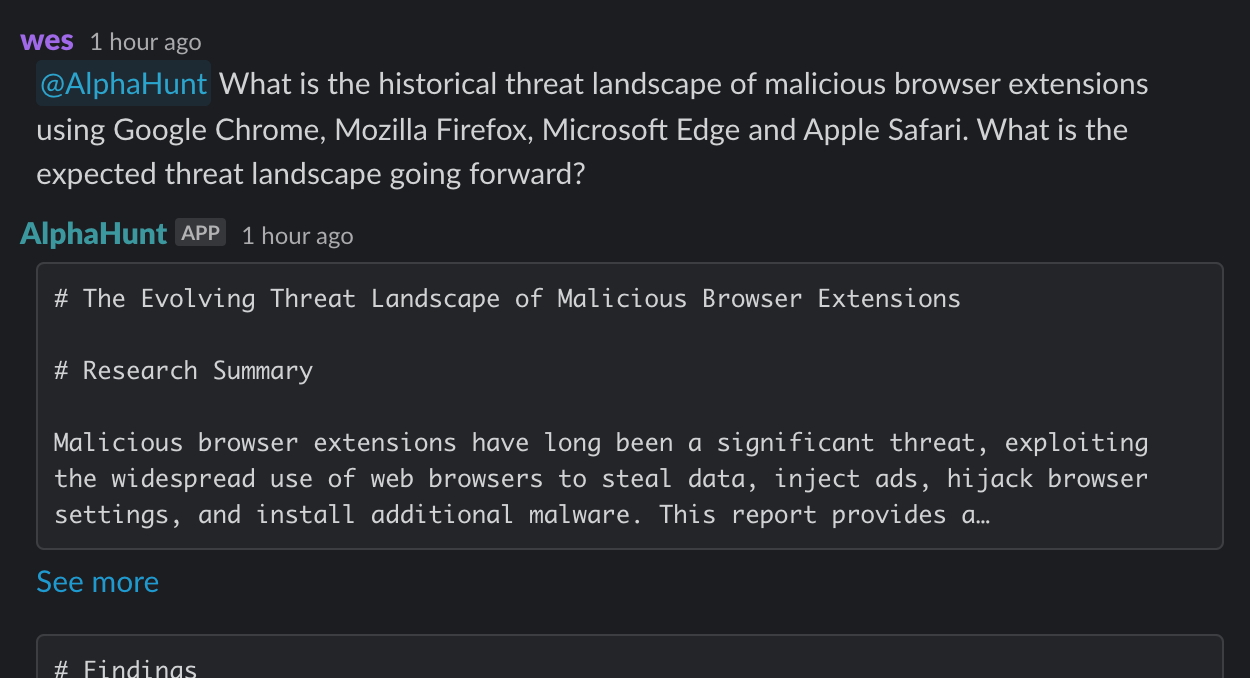The Evolving Threat Landscape of Malicious Browser Extensions
Malicious browser extensions have long been a significant threat, exploiting the widespread use of web browsers to steal data, inject ads, hijack browser settings, and install additional malware...




Sometimes simple questions lead to complex intelligence.
TL;DR
- Google Chrome: Google Chrome has been a primary target for malicious browser extensions due to its large user base.
- Mozilla Firefox: Similar to Chrome, Firefox has faced significant threats from malicious extensions.
- Microsoft Edge: Microsoft Edge has also been targeted by malicious extensions, although to a lesser extent.
- Apple Safari: The rise in macOS adoption has led to an increase in malware targeting Apple Safari.
- Emerging Trends: The future threat landscape for malicious browser extensions is expected to involve more sophisticated social engineering tactics.
Research Summary
Malicious browser extensions have long been a significant threat, exploiting the widespread use of web browsers to steal data, inject ads, hijack browser settings, and install additional malware. This report provides a comprehensive analysis of the historical threat landscape of malicious browser extensions across Google Chrome, Mozilla Firefox, Microsoft Edge, and Apple Safari, and assesses the expected future trends and mitigation strategies.
Historical Context
Historically, Google Chrome and Mozilla Firefox have been the primary targets for malicious browser extensions due to their large user bases. These extensions often masquerade as legitimate tools, such as productivity enhancers or security add-ons, but contain hidden malicious code. Notable incidents include the DataSpii and Nigelthorn campaigns, which compromised millions of users by harvesting sensitive data and injecting malicious scripts. Microsoft Edge and Apple Safari have also faced similar threats, although to a lesser extent. The increasing adoption of macOS has led to a rise in malware targeting Apple Safari, with infostealers and remote access trojans (RATs) being the most common threats.
Current Threat Landscape
Google Chrome remains a primary target due to its extensive extension ecosystem, which makes it challenging to detect and remove malicious extensions promptly. Mozilla Firefox has faced significant threats from malicious extensions, with campaigns exfiltrating browsing data and authentication credentials. Microsoft Edge, while less targeted, has seen incidents where vulnerabilities allowed attackers to covertly install extensions without user consent. Apple Safari, with its smaller extension ecosystem, has seen a rise in targeted malware campaigns as macOS adoption increases.
Emerging Trends
The future threat landscape for malicious browser extensions is expected to evolve with more sophisticated social engineering tactics, exploitation of browser vulnerabilities, and targeting of enterprise environments. Attackers are likely to leverage advanced techniques to bypass security measures and gain access to sensitive data. The use of advanced social engineering tactics, such as phishing campaigns and fake extension updates, is expected to increase, tricking users into installing malicious extensions.
Breaches and Case Studies
-
(2024-12-29) Dozens of Chrome Extensions Hacked, Exposing Millions of Users:
- Description: 16 Chrome extensions were breached, exposing over 600,000 users to credential theft and other risks.
- Actionable Takeaways: Regularly review and remove unnecessary extensions, implement strict extension policies, and educate users about the risks.
- References: The Hacker News
-
(2024-08-12) Malicious Browser Extensions Leveraged in Widespread Malware Compromise:
- Description: Over 300,000 Google Chrome and Microsoft Edge users were impacted by a massive malware campaign involving malicious browser extensions.
- Actionable Takeaways: Enhance browser security features, implement strict extension policies, and monitor browser performance for unusual activity.
- References: SC World
-
(2023-07-28) The Rise of Malicious Chrome Extensions Targeting Latin America:
- Description: IBM Security Lab observed an increase in campaigns related to malicious Chrome extensions targeting Latin America, focusing on financial data theft.
- Actionable Takeaways: Implement region-specific security measures, educate users about phishing tactics, and monitor financial transactions for anomalies.
- References: Security Intelligence
Recommendations, Actions, Suggested Pivots, Forecasts and Next Steps..
(Subscribers Only)




![[DEEP RESEARCH] BadIIS Isn’t Enough: The IIS Module + HTTP Fingerprints That Catch SEO-Fraud Cloaking](/content/images/size/w600/2026/02/z-2.png)
